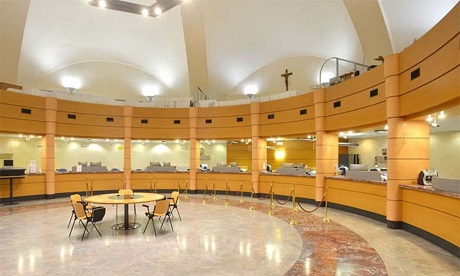The Vatican bank deputy CEO was removed from his position and escorted from the Vatican on Monday last week.
The news of Giulio Mattietti’s removal from the bank (correctly called the Institute of Religious Works) has been confirmed by the Holy See press office.
It is not clear why Mattietti was removed, although Italian media suggest there was a similar occurrence in the past few days with another bank employee.
However, the bank said last Friday that Mattietti’s removal was part of “normal physiological management affairs.”
It also claimed “many of the details published by the press are not correct”.
Reports say Mattietti’s removal was to preserve the integrity of documents and computer files he may have wanted to take with him.
They also say a probe into Mattietti’s activities will focus on those documents and on his computer files.
The former Director General of the bank, Paolo Cipriani, appointed Mattietti head of the computer department in 2007 after a decade of service within the institute.
Cipriani was convicted last year for violating anti-money laundering laws during his time in office in 2010.
He was found guilty of not providing JP Morgan crucial information regarding three separate banking operations of approximately $140,000, $57,000 and $119,000.
Mattietti was promoted to head of the bank in 2015 by the current Director General, Gian Franco Mammì.
The bank has been involved in numerous controversies.
It was involved with the Banco Ambrosiano which collapsed in 1982.
Accusations of fraudulent deals involving the Vatican Bank were cited at the time.
In 1990, St Pope John Paul II instituted a reform of the institution’s governing structure but scandals continued.
Pope Benedict XVI created the Financial Information Authority in 2010 to act as a financial watchdog unit for the Vatican.
As part of the reform attempt, the Vatican signed numerous bilateral agreements with other countries – including Italy and the United States – to share financial information.
The agreements are designed to fight money laundering and tax evasion and to keep the Vatican Bank from being used as an offshore tax haven.
Benedict also allowed an outside agency to review the Vatican’s efforts on financial reform.
He invited Moneyval, the Council of Europe’s anti-money laundering agency, to inspect the Vatican’s financial operations.
Source
- ANSA en Vatican
- Crux
- Image: Iglesia.info
Additional reading
News category: World.




